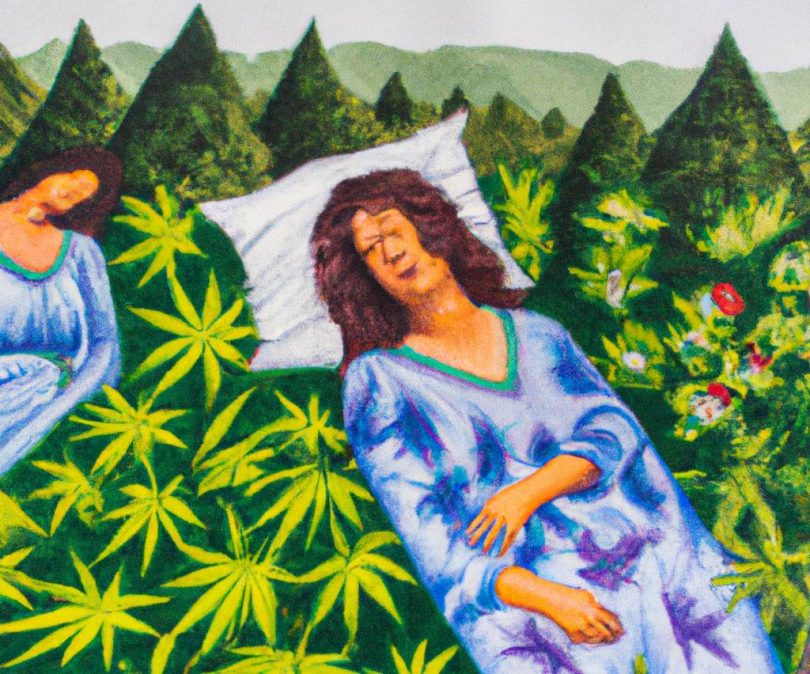With approximately 20%-30% of the population suffering from chronic insomnia[1] CBD has become a welcome alternative to the possible long term consequences of synthetic sleep aids.[2] In large doses, CBD has been shown to cause drowsiness or fatigue in some users, but there may be another explanation for this side effect.[3]
The Body’s Response to CBD
The endocannabinoid system within the body is composed of two main types of cannabinoid receptors.[4] CB1 receptors, which bond primarily with THC, tend to be concentrated in the brain, while CB2 receptors can be found throughout the body. CBD has been shown to have a low affinity for both cannabinoid receptors, but it effects the way other cannabinoids bind to receptors and also helps increase the amount of endocannabinoids the body produces. Through these paths, and others, CBD has been shown to be both anti-inflammatory and effective in pain management.[5] CB2 receptors also exist in the brain, meaning there are also psychological and neurological effects that occur with CBD consumption. Many users report calmness as a welcome effect, and for the purposes of stimulating sleep, a very promising route may lie in the treatment of anxiety.[6]
Drowsiness, or a Cumulative Effect?
Anxiety is one of the leading causes of insomnia.[7] It is also one of the reasons that benzodiazepines are often prescribed to help people not only with anxiety but also with insomnia.[8] One possible explanation for why CBD causes drowsiness may be that it creates multiple responses in the body that leads to sleep. By reducing anxiety, inducing a calmer feeling and relieving pain, CBD may be addressing physical and mental barriers that cause insomnia. For those that don’t struggle falling asleep, this may manifest in the form of general drowsiness. At this point, data is not conclusive whether CBD consumption is a correlation or a causation in making people tired.
Adjusting the Dosage
While some studies confirm CBDs effect on limiting anxiety, that does not necessarily confirm that it will be enough to induce sleep.[9] Low doses of CBD do not inherently make you sleepy (some users even report that very low doses make them a little uneasy and irritated),
but larger amounts have the potential to do so. The question emerges, what is the threshold to induce sleep? One study conducted on rats found the range to be between 10 mg-100 mg. That doesn’t necessarily give us a clue about Humans, but most people will usually start seeing a noticeable effect of CBD beyond 30 mg/day, sometimes even 300 mg/day, but every person is different. Depending on what variables lead to sleeplessness, individuals may require different dosages to accommodate their needs.
References
1. Buscemi N, Vandermeer B, Friesen C, et al. Manifestations and Management of Chronic Insomnia in Adults: Summary. 2005 Jun. In: AHRQ Evidence Report Summaries. Rockville (MD): Agency for Healthcare Research and Quality (US); 1998-2005. 125.
Available from: https://www.ncbi.nlm.nih.gov/
2. Larson, E. B., & Zollman, F. S. (2010). The Effect of Sleep Medications on Cognitive Recovery From Traumatic Brain Injury. Journal of Head Trauma Rehabilitation, 25(1), 61–67. https://doi.org/10.1097/htr.
3. CBD: Safe and effective? (2020, December 18). Mayo Clinic. https://www.mayoclinic.org/
4. Christian C. Felder, K. E. Joyce, Eileen M. Briley, Jaleh Mansouri, Ken Mackie, O. Blond, Y. Lai, A. L. Ma, & Mitchell R. (1995). Comparison of the pharmacology and signal transduction of the human cannabinoid CB1 and CB2 receptors. Molecular Pharmacology, 48(3), 443–450. https://pubmed.ncbi.nlm.nih.
5. Boyaji, S., Merkow, J., Elman, R. N. M., Kaye, A. D., Yong, R. J., & Urman, R. D. (2020). The Role of Cannabidiol (CBD) in Chronic Pain Management: An Assessment of Current Evidence. Current Pain and Headache Reports, 24(2). https://doi.org/10.1007/
020-0835-4
6. Skelley, J. W., Deas, C. M., Curren, Z., & Ennis, J. (2020). Use of cannabidiol in anxiety and anxiety-related disorders. Journal of the American Pharmacists Association, 60(1), 253–261. https://doi.org/10.1016/j.
7. Swanson, L. M., Pickett, S. M., Flynn, H., & Armitage, R. (2011). Relationships Among Depression, Anxiety, and Insomnia Symptoms in Perinatal Women Seeking Mental Health Treatment. Journal of Women’s Health, 20(4), 553–558.
https://doi.org/10.1089/jwh.
8. Lader, M. H. (1999c). Limitations on the use of benzodiazepines in anxiety and insomnia: are they justified? European Neuropsychopharmacolo
9. Shannon S, Lewis N, Lee H, Hughes S. Cannabidiol in Anxiety and Sleep: A Large Case Series. Perm J. 2019;23:18-041. doi: 10.7812/TPP/18-041. PMID: 30624194; PMCID: PMC6326553.
10. Zhornitsky S, Potvin S. Cannabidiol in humans—the quest for therapeutic targets. Pharmaceuticals (Basel) 2012 May 21;5(5):529-52. DOI: https://doi.org/10.3390/ph5050529










